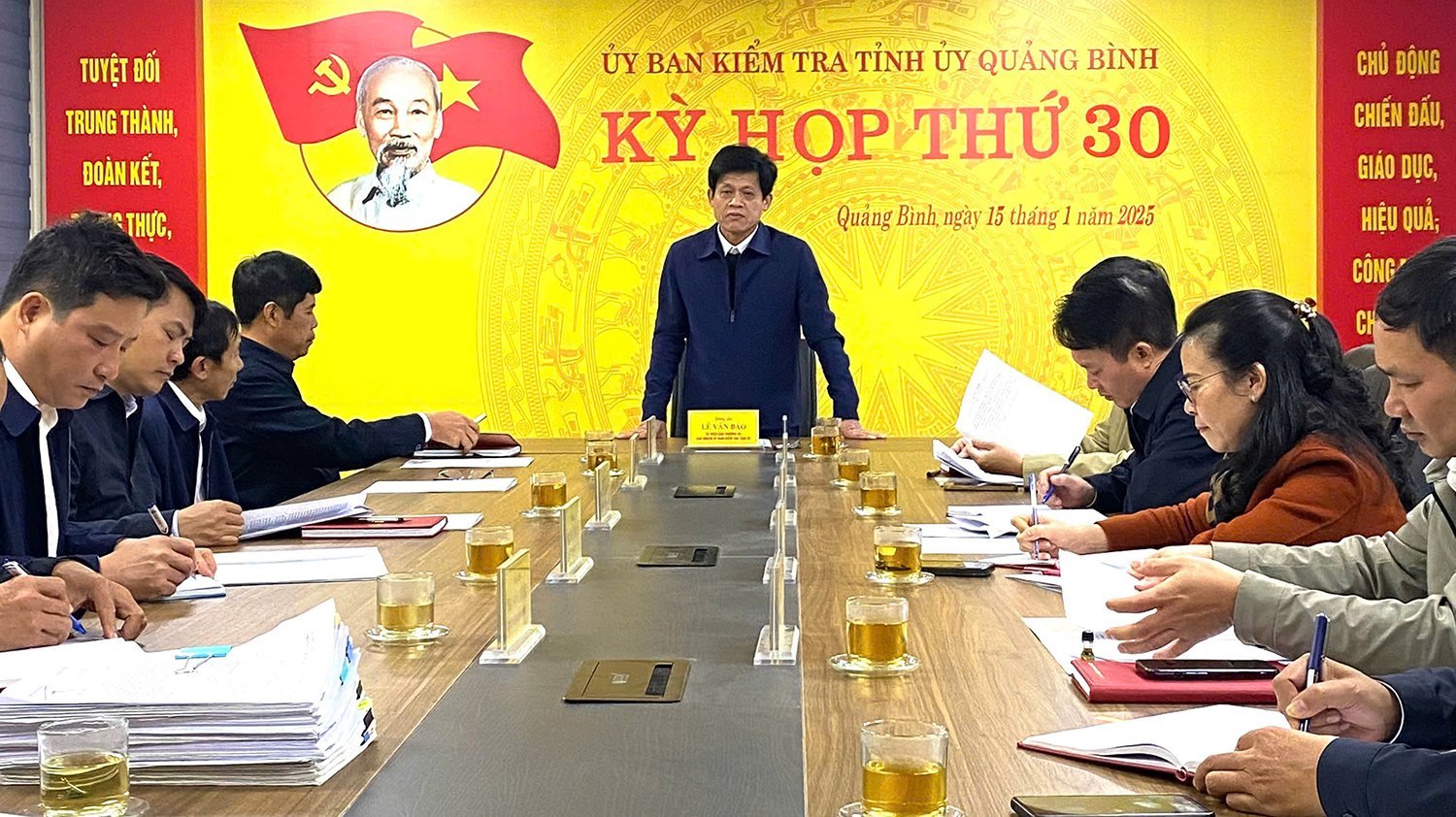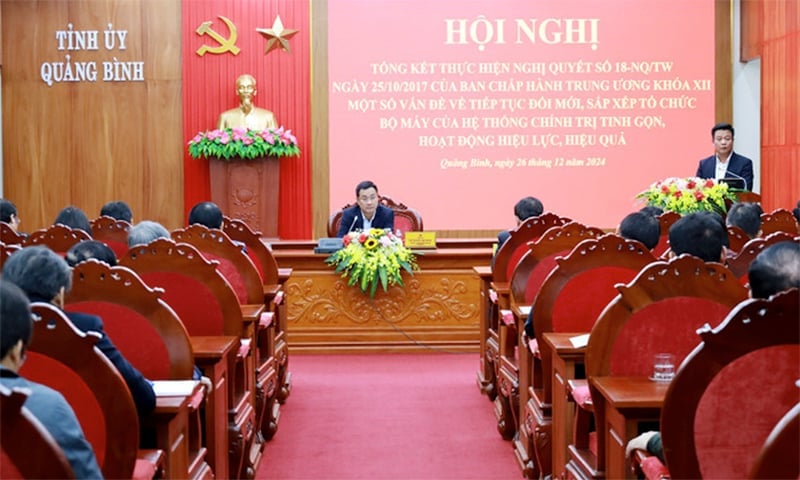(QBĐT) - On November 26, 2024, the 15th National Assembly passed the 2024 Notary Law, which will take effect from July 1, 2025. This law not only overcomes the limitations and shortcomings of the current notary system but also creates a legal basis for the sustainable and quality development of the notary industry, while being consistent with international practices. To help readers better understand the new points of the law, reporters of Quang Binh Newspaper had an interview with Ms. Hoang Thi Le Hai, Head of the Department of Legal Dissemination and Education (Department of Justice). The following is the content:
● Reporter: The 2024 Notary Law changes a number of new concepts and regulations on appointment and practice standards of notaries (CCV) and notary practice organizations (TCHNCC). Can you elaborate on this?
- Ms. Hoang Thi Le Hai: The 2024 Notarization Law changes a number of concepts such as replacing the phrase "contract, transaction" with "transaction", replacing the regulation on "certification of translation" with "certification of translator's signature" according to the provisions of the law on certification...
A notable change of the law is the adjustment of the age for appointment of notaries. Specifically, one of the criteria for appointment of notaries is that the Vietnamese citizen must not be over 70 years old and the notary must be automatically dismissed when over 70 years old. However, notaries over 70 years old who are practicing notary at the time the law comes into effect can continue to practice notary for a period of 2 years.
In addition, the law also reduces the required legal work time from 5 years to 3 years to be appointed as a CCV. The probationary period for practicing notary practice stipulates that all subjects must practice for 12 months instead of having a distinction as before.
 |
The 2024 Notarization Law assigns the provincial People's Committee the responsibility to issue a project to manage and develop TCHNCC, and at the same time consider and decide to transfer the authority to authenticate transactions from the District-level Justice Department and the Commune-level People's Committee to TCHNCC in districts where TCHNCC has been developed to meet the notarization requirements of individuals and organizations according to Government regulations.
For the Notary Office (PCC), to ensure the similarity in operating conditions between the two types of TCHNCC, PCC and Notary Office (VPCC), and to enhance the stability of PCC, the law stipulates that PCC must have 2 CCV or more, except in cases where district-level localities are established to organize and operate as private enterprises, PCC can have 1 CCV. The law allows PCCs currently having 1 CCV to continue operating and within 1 year from the effective date of the law must meet the condition of having 2 CCV or more. The law has assigned the Director of the Department of Justice to appoint, dismiss, and remove the head of PCC instead of assigning it to the Chairman of the Provincial People's Committee as currently. The Government stipulates a roadmap for completing the conversion of PCCs into VPCCs and dissolving PCCs in localities.
Regarding the VPCC, in addition to being organized and operating as a partnership, it is also allowed to establish a VPCC as a private enterprise in district-level administrative units with low population density, underdeveloped infrastructure and services...
The Law also adds a provision that the Notary Public Office may only change its headquarters address within the district-level area where the headquarters is located according to the decision permitting the establishment of the Provincial People's Committee to ensure reasonable distribution, stable development, and meet the notarization needs of individuals and organizations; replace the provision on transferring the Notary Public Office in the form of a partnership with a provision on transferring the entire capital contribution of all general partners of the Notary Public Office to both comply with the provisions of the Law on Enterprises and ensure the stable operation of the Notary Public Office; add a provision on selling the Notary Public Office in the form of a private enterprise, a provision on temporarily suspending the operation of the Notary Public Office to ensure the legitimate rights and interests of the person requesting notarization and related organizations and individuals...
On the other hand, the law also specifically stipulates the responsibility for terminating the membership status of a general partnership member. Within 2 years from the date of termination of the general partnership member status, the general partnership member who has terminated his/her general partnership member status must still be jointly responsible with all of his/her assets for the debts of the limited liability company arising during the time he/she was a general partnership member of that limited liability company; after this period, the new limited liability company may be established, participate in the establishment of a new limited liability company, enter into a partnership with another limited liability company or purchase a limited liability company organized and operating in the form of a private enterprise in order to increase the responsibility of the limited liability company, and overcome the situation of frequent changes in the general partnership members of the limited liability companies.
● Reporter: Regarding the regulations on notary practice, how will this law be amended and supplemented, madam?
- Ms. Hoang Thi Le Hai: To better ensure the rights of notaries, the 2024 Notary Law adds a new form of practice, which is notaries working under a labor contract at notaries to create more opportunities for notaries to practice, while helping notaries solve difficulties in the shortage of notaries... The Law also stipulates the reduction of practice registration procedures for notaries and stipulates that the Department of Justice issues notary cards when carrying out procedures for establishment, registration of operation or addition of notaries of TCHNCC...
● Reporter: The 2024 Notary Law has new regulations on electronic notarization. Is this an important premise to create a legal basis for the digital transformation of notarization activities, madam?
- Ms. Hoang Thi Le Hai: That's right. Article 62 and Article 65 of the law clearly stipulate this content. Accordingly, there are two forms of electronic notarization: direct electronic notarization (the person requesting notarization enters into a transaction in front of the notary, then the notary and the notary certify the transaction with a digital signature to create an electronic notarized document) and online electronic notarization (the parties to the transaction requesting notarization are not present at the same location and enter into the transaction online in front of the notary). The notary and the notary certify the transaction with a digital signature to create an electronic notarized document.
The promulgation of the 2024 Notary Law marks an important step forward in perfecting the notary system, creating a solid legal foundation for the development of the notary industry, while meeting the requirements of society and organizations and individuals. The amendments and supplements to the law not only help improve notary activities but also contribute to improving the quality of notary services, protecting the legitimate rights and interests of citizens and businesses.
● Reporter: Thank you!
NH.V (performed)
Source: https://www.baoquangbinh.vn/phap-luat/202502/mot-so-diem-moi-cua-luat-cong-chung-nam-2024-2224330/











































![Charming Vietnam [ Cat Tien National Park ]](https://vstatic.vietnam.vn/vietnam/resource/IMAGE/2025/2/12/c05c34322e4f4cac874e7f971dfaddca)
![Charming Vietnam [ Chau Doc ]](https://vstatic.vietnam.vn/vietnam/resource/IMAGE/2025/2/12/e96a46dceb5e41b1bcc3cf7dc6d54708)
![Charming Vietnam [ Phong Nha National Park ]](https://vstatic.vietnam.vn/vietnam/resource/IMAGE/2025/2/12/1cc2c12b6cb84938b32182cccf560b3c)


















Comment (0)